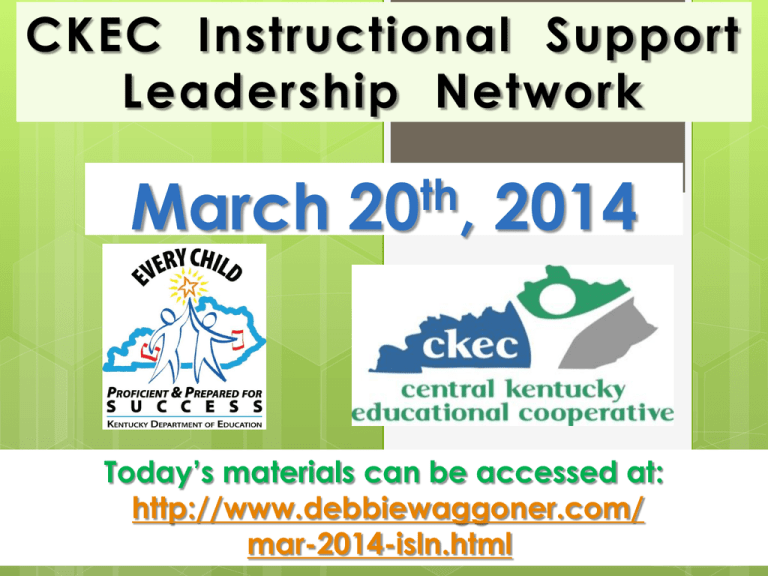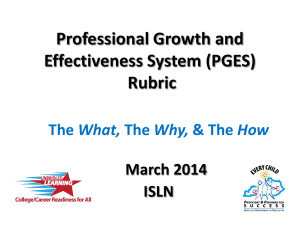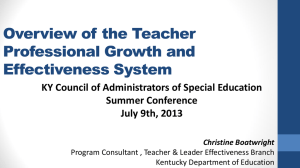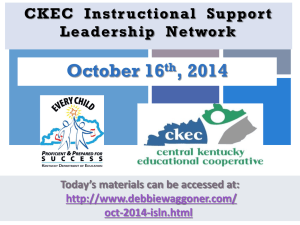CKEC March ISLN powerpoint
advertisement

CKEC Instructional Support Leadership Network March th 20 , 2014 Today’s materials can be accessed at: http://www.debbiewaggoner.com/ mar-2014-isln.html CKEC ISLN Facilitation Team Debbie Waggoner, KDE/CKEC Instructional Specialist – Math & Social Studies Emphasis Terry Rhodes, KDE/CKEC Instructional Specialist – Science Emphasis Kelly Philbeck, KDE Literacy/LDC Rebecca Woosley, (Monica Osbourne) Effectiveness Coach, KDE Mike Cassady, PGES Consultant CKEC/KDE Sharing Learning Over 100 years of Excellence Supporting Teaching Enhancing Norms Be an ambassador of “lifelong learning.” Show your enthusiasm for the work, support the learning of others, be willing to take risks, participate fully. Come to meetings prepared. Be on time, any preparations/ readings completed, with necessary materials. Be focused during meetings. Stick to network goals/ targets, use technology to enhance work at hand, limit sidebar conversations. Work collaboratively. All members’ contributions are valued and honored, seek first to understand, then be understood. PINK Sheet ISLN Meeting IMPORTANT NOTES How will I use this What do I want to information, and remember? how will I share it with others in my district? Today’s Agenda Introduction – Review of Learning Forward module materials – Which materials can you use for professional learning with your teachers? Concurrent Sessions: --Science Network Deconstruction and Classroom Assessment Updates – Terry Rhodes --Social Studies Network C3 Framework and Instructional Shifts Updates – Debbie Waggoner --PGES Rubric: the what, the why, and the how (reflections on using the EDI rubric from Fayette County) – Rebecca Woosley (Monica Osborne) & Mike Cassady Closure – Spotlight: Anderson County – PGES Roll-Out Plan Sharing How is your district doing with Implementation? How are you using your district network participants? What’s your plan for preparing all staff for TPGES by September? Join our backchannel at: www.todaysmeet.com/CKECISLN Inside Cover Kentucky’s Core Academic Standards Leadership Assessment Literacy Highly Effective Teaching and learning Network Foundations…. Pillars again TPGES –Teacher Professional Growth and Effectiveness System What does effective teaching look like? Anyone? Anyone? What does effective professional learning look like? If your Faculty Meetings, PLCs, PDs, workshops, etc. don’t look like effective teaching, then you are missing the chance to help your teachers grow. 9 http://learningforward.org/publications/implementing-common-core/professional-learning-units 10 11 Packet page 2-3 12 Packet page 4 1 2 3 4 5 6 7 8 9 10 11 12 13 14 15 13 Packet page 5 14 15 Packet page 6 16 Packet pages 7-8 17 http://learningforward.org/publications/implementing-common-core/professional-learning-units DISTRICTS A-F G-O P-Z Concurrent Sessions Session 1 Session 2 Session 3 Side Hallway PGES Rubric Main Room Social Studies Network Update Front Room Science Network update Main Room Social Studies Network Update Front Room Science Network update Side Hallway PGES Rubric Front Room Science Network update Side Hallway PGES Rubric Main Room Social Studies Network Update UPDATES Deconstruction Work First round of deconstruction was done in February March meeting will focus on revisiting work from Feb, making revisions and adding in the assessment component Adjusted schedule due to Jan weather Classroom Assessment of KCAS-Science Selected Response Multiple Choice True/False Matching Fill in-the-blank Students scores on selected response assessments are usually figured as the number or proportion of questions answered correctly. Classroom Assessment of KCASScience Written Response Short Answer Items Extended written response items Students construct an answer in response to a question or task. Short answer items call for a very brief response having one or a limited range of possible right answers. Extended written response require a response that is greater in length and generally have a greater number of acceptable or correct answers. Classroom Assessment of KCAS-Science Performance Assessment Performance task Performance criteria Assessment is based on observation and judgment; used to judge both real-time performances (demonstrations) and products (or artifacts) that students create. It has two parts: the task and the criteria for judging the quality of the response (rubric). Classroom Assessment of KCAS-Science Personal Communication Questions during instruction Interviews and conferences Participation Oral exams Student journals and logs Finding out what students have learned through structured and unstructured interactions with them. Usually formative, but can also be summative For your scenario, decide whether each assessment is: Strong- works well for all learning targets of this type Good- works for many learning targets of this type Partial-works in some instances for learning targets of this type Poor-never works for learning targets of this type To make your choices, ask yourself, which methods will provide the “most accurate information with the highest degree of efficiency?” Packet page 9-10 Packet page11 Moving NGSS to Implementation Science Network Meetings: -March 24th -April 29th Terry Rhodes terry.rhodes@education.ky.gov 859-585-7762 www.terryrhodes1science.com DISTRICTS A-F G-O P-Z Concurrent Sessions Session 1 Session 2 Session 3 Side Hallway PGES Rubric Main Room Social Studies Network Update Front Room Science Network update Main Room Social Studies Network Update Front Room Science Network update Side Hallway PGES Rubric Front Room Science Network update Side Hallway PGES Rubric Main Room Social Studies Network Update CKEC Social Studies Content Network Meetings Tuesday, March 25th, 2014 Tuesday, April 22nd, 2014 Debbie Waggoner KDE/CKEC *LAdebbie.waggoner@education.ky.gov County Office of Education C3 Webcast *Dr. Kathy Swan's "Achieving the C3: An exploration into 21st century www.debbiewaggoner.com social studies" 30 Packet page12 31 32 Packet page13 Read your C3 section & Take Notes 5 minutes Discuss, relate to Each group shares Framework, & Summarize a one sentence on Green sheet summary whole group 5 minutes 5 minutes What is your vision for social studies teaching and learning? 16 C3 32.06 I nstructional Shifts Iodine 1. Craft questions that matter. 2. Establish a collaborative context to support student inquiry. 3. Integrate content and skills meaningfully. 4. Articulate disciplinary literacy practices and outcomes. 5. Provide tangible opportunities for taking informed action. Packet page14-15 36 Packet page16 Growth vs Fixed Mindset Why is having a growth mindset important for social studies teaching and learning? Packet page17 Packet pages 18-19 38 Compelling and supporting questions C3 lesson plan template Packet page 20-22 DISTRICTS A-F G-O P-Z Concurrent Sessions Session 1 Session 2 Session 3 Side Hallway PGES Rubric Main Room Social Studies Network Update Front Room Science Network update Main Room Social Studies Network Update Front Room Science Network update Side Hallway PGES Rubric Front Room Science Network update Side Hallway PGES Rubric Main Room Social Studies Network Update Professional Growth and Effectiveness System (PGES) Rubric The What, The Why, & The How March 2014 ISLN Today’s Targets Deepen our understanding of PGES Implementation Rubric Practice using the rubric to support district implementation What is the PGES Implementation Rubric? A resource designed for district leaders to help districts create a robust PGES by guiding self-assessment about PPGES and the TPGES implementation across the district providing definitions and evidence of strong and weak implementation informing and guiding plans for next steps Incorporates the Measures of Effective Teaching (MET) principles Integrates KDE’s Capacity Framework human material organizational structural Human Capacity: Organizational Capacity: Structural Will and Skill Collaboration, Communication Procedures and Interaction Capacity: and Policies Material Capacity: Fiscal and Physical KDE Capacity Framework * to provide consistency of implementation across the state * to communicate priorities to stakeholders * to help districts go beyond technical implementation to the system structure that must be in place for effective PGES implementation * to take the conversation to the needed system shifts – (building on what’s in place or what can be refined) Take 2 minutes… What do you notice about the format/organization of the Implementation Rubric? Packet page 25-34 Rubric Format Includes an overall guiding question for each section of the rubric/tool Includes icons connected to the 4 capacities with the guiding questions Identifies criteria for weak and strong implementation Includes evidence that indicates strong implementation Feedback from Fayette Co. Read and Reflect Review #6 - Assure Accuracy Independently, read and reflect on the questions, the weak & strong criteria and the evidence of success Decide where your district is currently on a scale of 1-4 and record it on a common, shared Packet pages 23-24 form. • Discuss your decisions, recording your district’s individual evidence on 1 form. • Discuss the evidence and come to consensus. • Use the evidence to identify any specific areas of strength and weakness and implications for next steps. PGES http://education.ky.gov/teachers/HiEffTeach/Pages/Student-Growth.aspx Enduring Skills Resources: • • • PowerPoint of process with notes and facilitator’s guide Sample lists of enduring skills for many content areas Archived Enduring Skills Process Lync session Support Resources How can you use the SGG resources to support your districts? CLOSES APRIL 30 MARCH 1APRIL 30 If you have questions as you take your next PGES implementation steps, contact your PGES consultant, Mike Cassady or Becky Woosley, effectiveness coach. 60 Packet pages 35-38 61 Packet pages 39-40 62 CKEC Instructional Support Leadership Network 2013-2014 NorthEast Christian Church September 19th, 2013 October 17th, 2013 November 21st, 2013 January 16th, 2014 February 20th, 2014 March 20th, 2014 Coming up this summer: ISLN/KLA Annual State-wide Meeting June 26th /27th Lexington Center MORE DETAILS COMING SOON June 26— 3 cycles of TED talks/sessions on these topics: Teacher Effectiveness, Highly Effective Teaching and Learning in Science/Social Studies, Principal Effectiveness (Would you like to lead a TED talk or session?) June 27— ‘morning working sessions’ on a variety of topics districts sign up for these as desired Please complete the yellow evaluation before you leave. We need your feedback! One Lone NUT How to Start a Movement - The One Lone NUT



